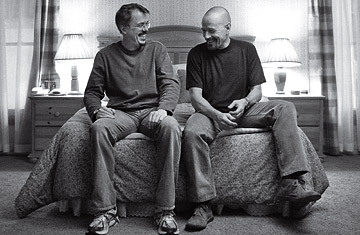
Gilligan, far left, and Cranston relax on the set of the White home — usually the site of tense scenes
(2 of 2)
But one trick to doing a cinematic TV series right is to understand that TV is not the movies. The films that Breaking Bad recalls — Sergio Leone's westerns, No Country for Old Men — work with big events, big images and grand themes. Great TV can do that. But series TV also works on a more intimate level. Breaking Bad is the story of not just Walter White, criminal, but also Walter White, husband and dad. That's what gives the show its disturbing force. You could hold Tony Soprano at arm's length; he was born into a criminal world alien to most of us. Walt, a hunched suburbanite who drives a Pontiac Aztek, chose his life. There but for an unimpressive high school chemistry record go I?
This story called for a star who could convincingly play explosive moments and minutiae. Cranston surprised viewers who knew him as Hal, the pratfall-prone dad from Malcolm in the Middle. But Gilligan had cast him years before as an X-Files villain. "I first knew him as a badass," Gilligan says. "When Malcolm came on the air, I did a double take: My God, that's Bryan Cranston?"
Between scenes, Cranston is in his trailer getting into character, which means shaving his head. Walt lost his hair to chemotherapy, then chose to stay bald. Cranston, who has immersively worked on Walt's backstory, says the severe coiffure does more than look fierce; it also offers psychological camouflage. "This is a specific look he wants," Cranston says. "As long as he doesn't recognize this guy, he can justify his actions. This is a different guy."
Walt has always been balanced by Jesse, but their odd-couple dynamic has changed. When the series began, Jesse was the punk and Walt the straight man, Jesse the nitwit and Walt the teacher. Over time, other differences have emerged. Jesse is more willing to act on feelings of passion and injustice, whereas Walt acts on cold self-interest. In his own feral, meth-head way, Jesse is the show's conscience. Though he was Walt's entrée into the drug world, we see that's he's really just a kid, not suited to the depths of corruption Walt drags him into. "There is this loss of innocence," says Paul, who won a supporting-actor Emmy last year for the role. "Yeah, Jesse cooks drugs, and it's horrible for society, but he has a good heart."
Season 3 ended with Jesse preparing to cross the moral point of no return, as Walt asked him to kill an innocent man in order to save their own lives. I won't say how Season 4 resolves that cliff-hanger, but the first episode plays out the consequences with taut and patient suspense. One thing is clear: Walt and Jesse can't go on like this endlessly.
Nor does Gilligan want them to. The creator says he has the broad outlines of a Season 5 in mind, but he hopes to set an end date. Most TV shows are about stasis — restoring the status quo over and over — but in the pilot of Breaking Bad, Walt makes a comment about his field that could be a motto for the series itself: chemistry "is about change ... growth, then decay, then transformation." Says Gilligan: "There's no reason a show like ER or Law & Order theoretically can't go on forever. But a show like this is designed to end." As all good experiments must.
